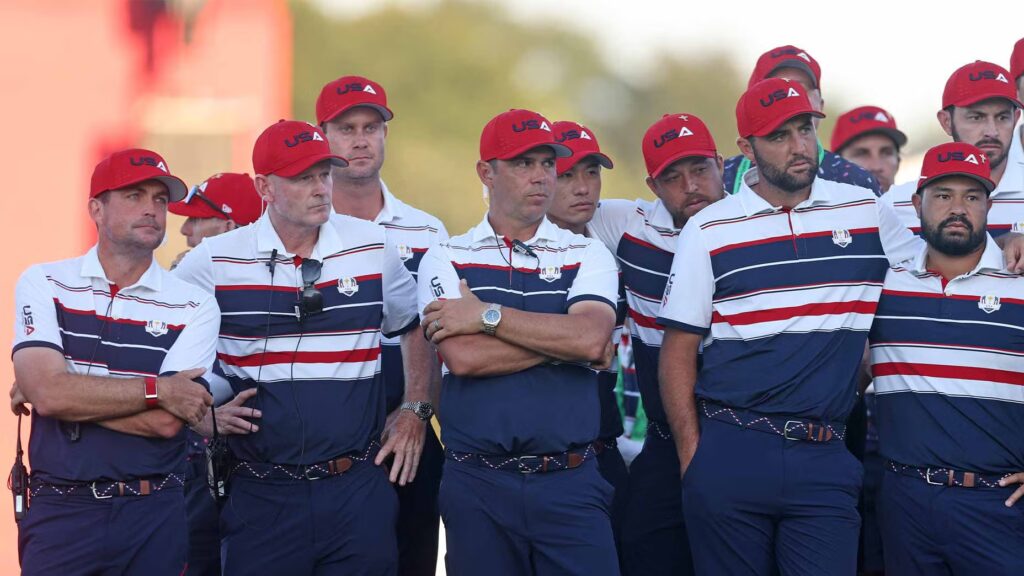USA Ryder Cup Analysis: Strategies for Success in 2027 and Beyond
The recent 15-13 defeat of the United States team against Europe in the 2025 Ryder Cup left fans and players alike reeling. As discussions continue months after the event, many are focused on what the U.S. team can do to improve their performance for the next competition in 2027 and beyond. Experts and analysts are weighing in, including sports commentator Trey Wingo, who has offered several bold strategies aimed at turning the tide in favor of American golfers.
Understanding the Ryder Cup Legacy
The Ryder Cup is one of golf’s most prestigious events, highlighting a fierce rivalry between the U.S. and European teams. The significance of this competition runs deeper than a mere battle over trophies; it encapsulates national pride and a rich history that captivates golf enthusiasts worldwide. Each match carries the weight of expectations, creating an atmosphere that many players describe as electric. However, the Americans have struggled to maintain consistent success, particularly in recent years.
The Value of Team Cohesion
One key issue raised by Wingo is the need for improved team cohesion. Unlike the Europeans, who excel in collaborative strategies and inter-player chemistry, American golfers often seem disconnected during high-pressure matches. Wingo highlights that achieving success in the Ryder Cup requires more than individual talent; it necessitates effective teamwork, particularly in formats like alternate shot. By fostering a stronger sense of unity, the U.S. team could dramatically enhance their chances in future competitions.
Rethinking the Presidents Cup
A significant point made by Wingo is the evaluation of the Presidents Cup’s impact on American golfers’ performance. He argues that this event, while featuring top international talent, lacks the competitive intensity and historical weight of the Ryder Cup. Critics, including Wingo, suggest that it could act as a distraction rather than a developmental opportunity. By prioritizing the Ryder Cup and reconsidering the nature of the Presidents Cup, the U.S. can focus resources and energy on becoming a more formidable force internationally.
Introducing a New U.S. Event
Wingo also proposes the idea of launching a dedicated U.S. team golf event designed to cultivate interest and investment in the Ryder Cup format. Drawing inspiration from the Seve Trophy, a successful European team competition held during non-Ryder Cup years, this new event could serve as a valuable training ground for American golfers. Such an initiative might cultivate a stronger attachment to the Ryder Cup format, encouraging players to develop the skills and chemistry necessary for success.
Fostering Match-Play Experience
Another essential strategy for the U.S. team lies in its approach to match-play formats. Wingo points out that the American team excels in individual competitions but struggles with cohesive play in team formats. By increasing opportunities for players to engage in match-play scenarios, whether through training camps or friendly competitions, they can develop the requisite skills and mental fortitude to excel under pressure.
Developing a Winning Mindset
The psychological aspect of competition cannot be overlooked. Historically, the European team harnesses a profound commitment to the Ryder Cup that translates into a winning mindset. This determination often gives them a critical edge. It is crucial for American golfers to cultivate a similar mindset by understanding the historical significance of the Ryder Cup and embracing the pressure that comes with competing for their nation.
Enhancing Communication Among Players
Effective communication is paramount for any successful team, and this is particularly true in competitive environments. Wingo suggests that improving communication methods during matches can significantly bolster teamwork. By emphasizing open dialogue and strategic discussions, players can adapt more fluidly to changing circumstances, ultimately boosting their performance. Enhanced communication strategies could help to counteract the momentary lapses that have plagued past U.S. teams.
The Role of Captains and Coaches
The influence of captains and coaching staff in the Ryder Cup cannot be understated. With the right leadership, teams can be inspired to perform at their best. Wingo emphasizes the importance of selecting captains who prioritize team-building and can foster a genuine connection among players. Captains with strong leadership skills can effectively instill a culture of accountability, camaraderie, and success.
Learning from Past Experiences
Lastly, it’s essential for the U.S. team to learn from its recent experiences, both positive and negative. Analyzing past performances provides valuable insights into areas needing improvement. This includes evaluating strategies, assessing player dynamics, and reflecting on what has worked or failed in previous competitions. Embracing a culture of continuous learning can help players evolve and adapt to the ever-changing landscape of the sport.
Moving Forward with Determination
In conclusion, the road to success for the U.S. team in future Ryder Cups will depend on implementing innovative strategies and fostering a holistic understanding of team dynamics. Whether it’s through improved communication, a renewed focus on cohesive play, or a commitment to the historical significance of the Ryder Cup, the American team has the potential to reclaim its place as a dominant force. As discussions and analyses continue, fans remain hopeful that a new chapter of success is on the horizon for U.S. golfers in the Ryder Cup.


